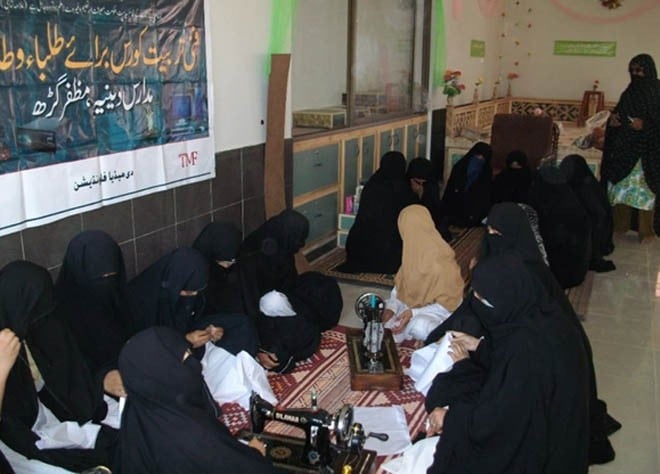
Hundreds of female madrassa students are being empowered in southern Punjab through a skill development programme

Laila Iqbal Hussain is very happy these days. She feels she has become very important for quite some time, as she has started contributing to the family income at a very tender age. She is a madrassa student who has been living in the hostel for more than three years.
After passing her middle standard examination from a government school in Muzaffargarh district, she was admitted to Jamia Fatimatuz Zahra madrassa in the city. Her father had told her at the time that being a poor labourer he couldn’t afford the educational expenditures of all of his five children.
At times, he would get some work and at others he would be without a job, and providing all his children with uniforms, shoes, and notebooks, and meeting their daily expenses etc., had become hard for him. Therefore, 17-year-old Laila, the eldest of the siblings, was admitted to the madrassa.
In the beginning of last year, she was asked by her teacher if she would like to join some skill development courses -- garment stitching and candle making, to be conducted by an organisation in the madrassa. She happily consented. On completion of the short courses, she had learnt both the skills. She could make candles with the material provided as well as stitch clothes with a sewing machine, donated by the organisation, without any supervision.
The madrassa management set up candle-making and stitching units on the premises, with the help of an interest-free microfinance organisation. Now dozens of female students including Laila have an opportunity to earn after study hours. The money earned through the activity is distributed among the working madrassa teachers and students at the end of the month. All of Laila’s family members are pleased with her, as she is not only getting religious education but also proving to be a helping hand for her farther.
Twenty-year-old Amna Abdul Hameed also has a story to relate. She is also a madrassa student, though in Bahawalpur. She goes to her madrassa in the morning, and returns home after 3pm. Last year, she attended a ‘Computer Literacy & Typing Course’, which was organised by an organisation in her madrassa, Jamia Manzoorul Mashaikh. It brought about a great employment opportunity for her.
Soon after completing the course, she was hired by a tuition centre for girls, situated at the University Chowk, Bahawalpur, as a part-time employee. From 4pm to 8pm, she not only works as the ‘Admin In-charge’ at the academy but also gives computer lessons to beginners. Her younger brother drops her at the madrassa in the morning and picks her up in the evening from the academy on a motorbike. She says she is getting the religious education for the Hereafter, but she always wanted to get some job beyond the madrassa system, to supplement the income of her father, who is the owner of a small grocery shop. And the computer course has definitely helped her get the academy job.
One can come across dozens of similar stories by visiting the madrassas, selected by The Media Foundation (TMF), a non-profit organisation, for skills development among women in southern Punjab districts last year. Imtiaz-ur-Rehman, director programmes at TMF, says that a project was launched in 2015 for women empowerment through skills development among teachers and students of madrassas in three districts of southern Punjab including Multan, Muzzaffargarh and Bahawalpur.
He said that southern Punjab is one of the most underdeveloped regions in the country. It is often criticised for being one of the major recruitment regions for extremist and terrorist organisations. Such interventions, he said, contribute towards reducing the possibility of youth joining militant organisations and falling prey to terrorist mindset.
To ascertain the level of interest among the madrassa teachers and students for learning some employment skills, and the job market needs, a survey-based research study was conducted in the selected madrassas in three south Punjab district. It was encouraging that, in response to a question, 100 per cent respondents said they wanted to learn employment skills in their madrassas.
Rehman says that a multidimensional approach was proposed to address the issue of radicalism by imparting skills to the madrassa teachers and students to increase their employability and engage them in community work beyond religious services. Memorandums of understanding were signed with the madrassa managements, and established training centres/institutions in these districts were engaged for successful execution of the project.
In the first phase of the project, Azmat Abbas, executive director of TMF, says skills such as computer literacy, garment stitching, candle making, health and hygiene, and beautician courses were offered to female students in three districts of Punjab. More than 500 girls and 1000 boys enrolled at various madrassas benefited from these courses.
Hufza Haneef, a teacher at Jamia Jamal-ul Madaris in Multan, terms the intervention beneficial both for teachers and students. The 22-year-old herself actively participated in all skill development activities in her madrassa. She believes that skill development projects would not only benefit the students but also their families at large.
The madrassa teacher says that skill development should be made part of the syllabus, so that students would have more options to make their living after graduating from madrassas. She says that English language courses should also be conducted in madrassas to enhance the chances of their interaction with the outside world.
In the second phase that started in early 2016, the project has been extended to five districts with an aim to reach out to more than 4,000 students, educate them on human rights and civic education and conduct skill development trainings to improve their employability beyond the madrassa sector.